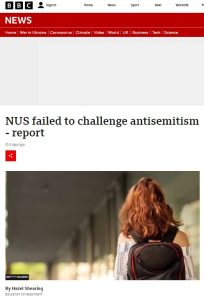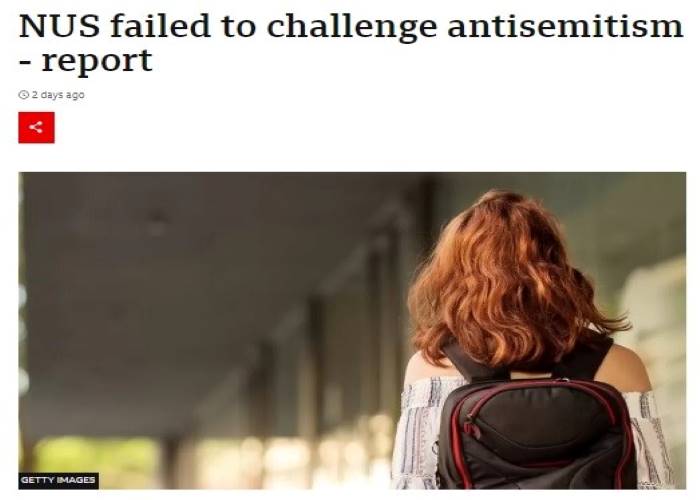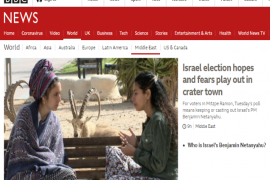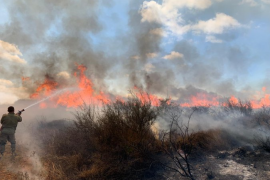On January 12th the BBC News website published an article by education correspondent Hazel Shearing relating to the publication of the findings of an independent inquiry into antisemitism at the UK’s National Union of Students (NUS).
In addition to appearing on the website’s ‘education’ page, that article – headlined ‘NUS failed to challenge antisemitism – report’ – also appeared in the ‘updates’ section of the ‘Middle East’ page and despite the fact that it concerns a UK domestic story, it is tagged “Israel & the Palestinians”.
Shearing’s article begins well enough and provides a link to the report on the investigation led by lawyer Rebecca Tuck KC. Examples from the report are cited along with some of its recommendations and reactions from the NUS, the president of the Union of Jewish Students and the minister for higher education.
However, Shearing chose to give the last word on this story to representatives of two anti-Israel organisations under the sub-heading ‘Legitimate criticism’ and without clarifying to readers that those two organisations had made submissions to the inquiry.
The original version of the article stated:
“Dr Sara Husseini, director of the British Palestinian Committee, and Ben Jamal, director of the Palestine Solidarity Campaign, issued a statement to the BBC before the release of the report.
In it, they said there must be a “safe space for Palestinians to speak to the facts of their oppression”. They were “concerned about the conflation of antisemitism with advocacy for Palestinian rights, including legitimate criticism of the State of Israel”. And these concerns were “exacerbated” by the November dismissal of former NUS president Shaima Dallali over antisemitism allegations.”
No information was provided to readers regarding the obviously relevant “affiliations, funding and particular viewpoints” of those two organisations as required under BBC editorial guidelines on impartiality.
Readers were not informed that in addition to his position at the PSC, Ben Jamal is also a member of the British Palestinian Committee’s advisory council or that that organisation – which includes in its ‘core principles’ the statement “We understand the Palestinian cause as fundamentally a struggle against settler colonialism” – lists the Hamas linked anti-Israel activist Zaher Birawi as a member of its executive committee. Neither were readers told that Husseini was previously an advisor to senior PLO officials and a lobbyist or that she is linked to Al Shabaka.
Although information concerning the Palestine Solidarity Campaign’s non-transparent funding and long record of anti-Israel campaigning would clearly have helped readers put the talking points made by Jamal into their appropriate perspective, such background was not provided.
Moreover, some ten hours after the BBC’s article was originally published, it was amended to include yet another statement from Jamal – including uncritical promotion of the ‘apartheid’ smear – and it now reads:
“Ben Jamal, director of the Palestine Solidarity Campaign, claimed the investigation had been driven by “pressure” from the government and the UJS – both of which, he said, wanted “to reduce the space for legitimate critique of Israel’s oppression of Palestinians”.
“A consistent anti-racism means opposing antisemitism and standing in solidarity with Palestinians in their struggle against Israel’s system of apartheid,” he said.
Before the report was published, Mr Jamal and Dr Sara Husseini, director of the British Palestinian Committee, told the BBC in a joint statement that their concerns about the space for legitimate debate had been “exacerbated” by the November dismissal of former NUS president Shaima Dallali over antisemitism allegations.”
So as we see, Hazel Shearing and her editors apparently considered it appropriate to conclude a report on the topic of antisemitism in the UK’s main student body with amplification of political activists’ Livingstone Formulation-style talking points aimed at promoting claims that the investigation had shown to be unfounded.
That editorial decision – which the later addition of more remarks from Jamal indicates was entirely intentional – obviously does not contribute to audience understanding of the issue that is supposedly the subject matter of this report and is all the more unfortunate given the BBC’s existing record of promotion of the Livingstone Formulation.
Related Articles:






Just another heavily contrived attack on Israel and Jews – with all the usual lies and omissions. Come on, Rishi, sort out these racists at the BBC !
‘They say there must be a safe place for Palestinians to speak to the facts of their oppression’ (sic) well that certainly is not a university campus in any way shape or form. Their perception of Palestinian oppression is derived from their own Islamic terrorist masters oppressing their own people All this is accomplished via the many tentacles of the IRGC in the UK who fund these university activities designed, to not allow the existence of Jewish students and their university societies on campus. #defundthebbc